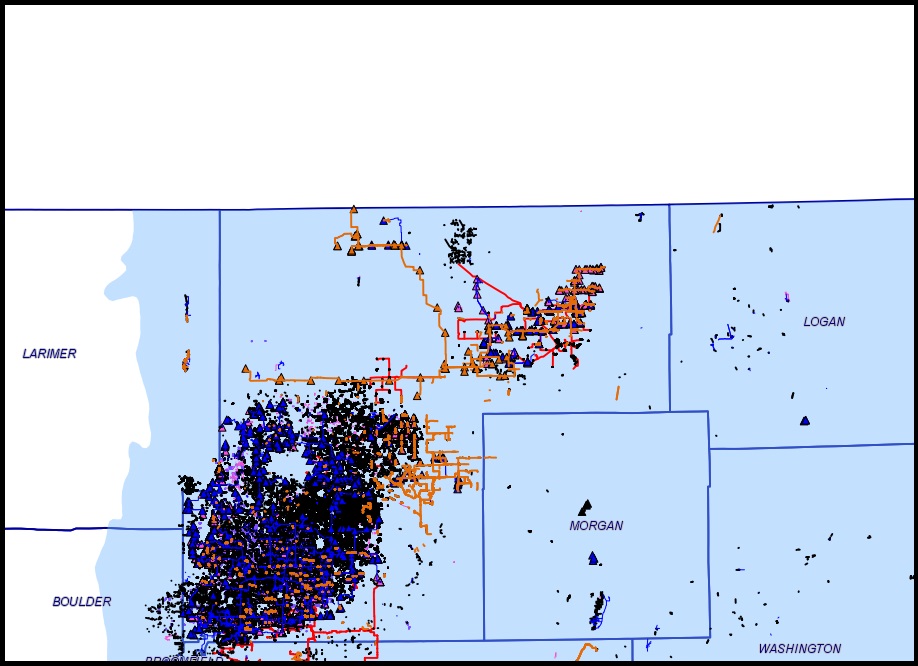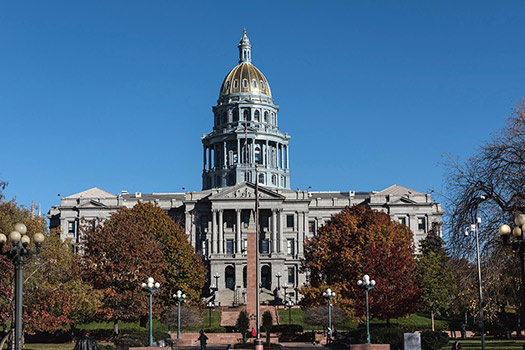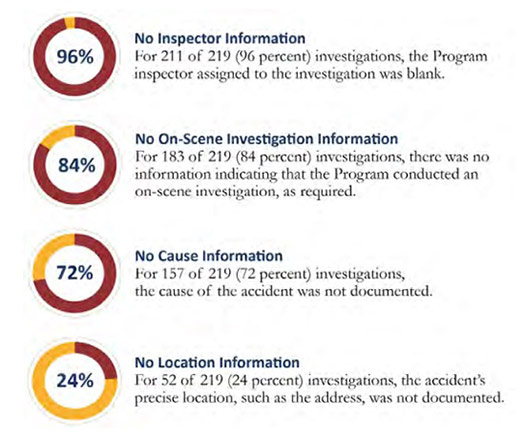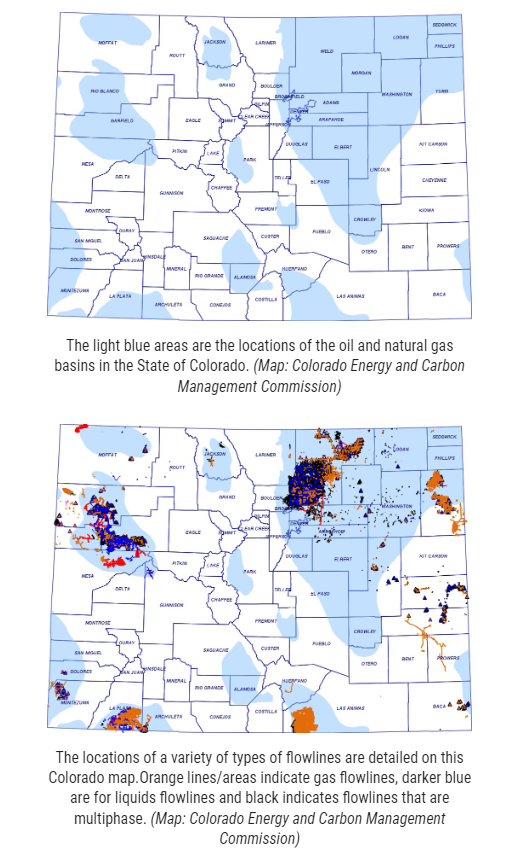October 2023, Vol. 250, No. 10
Features
Recordkeeping on Colorado Pipeline Safety Deemed Lacking
By Richard McDonough, P&GJ U.S. Correspondent
(P&GJ) — Regulations are part and parcel of life in the pipeline industry. For many businesses, regulations that are fairly enforced across all affected companies and organizations can be reasonable when the costs associated with implementing those regulations can be recovered from customers.
When regulations are not enforced or not enforced consistently, some businesses – ones that skirt the regulations – may benefit, while others – ones who strive to follow the regulations – may suffer for their adherence to the regulations.
Americans – both those in power as well as those who are just ordinary citizens – are generally a reactive people.
Thus, pipeline regulations are usually the purview of a small number of people directly affected by those standards until something unexpected happens.
Then, people – from those in power to those who are just ordinary citizens – question the regulations, the enforcement of the regulations, and why “they” didn’t do something to prevent the specific tragedy.
On occasion, there are proactive steps taken to review regulations, the enforcement of those regulations, and how those regulations could be changed to minimize negative outcomes and maximize successful endeavors.
Officials in Colorado consider the state’s regulations of the pipeline industry to be among the strongest in the nation: that Colorado’s regulations of pipelines promote safety within the industry, enhance the environment, and protect the lives and properties of Coloradans.
To determine if those views reflect actual reality, the Colorado Office of the State Auditor undertook a performance audit on the impact and enforcement of the gas pipeline safety regulations in the state.
The results, unfortunately, were not positive when it came to administration and records-keeping at the state level, despite Colorado’s stringent regulatory guidelines.
“Overall, auditors identified pervasive problems in each area of program [Colorado’s Gas Pipeline Safety Program] operations they reviewed, which auditors concluded collectively demonstrate that the program has not sufficiently met federal and state requirements, or legislative intent, to help ensure gas pipeline safety in Colorado,” according to a news statement issued June 12 by the Colorado Office of the State Auditor.
The statement continued by detailing a performance audit that found the program lacked adequate practices and processes for inspecting operators, enforcing safety requirements, assessing and collecting penalties from operators for noncompliance.
Among specific findings regarding shortcomings in the 134-page report, the performance audit found the program:
- failed to inspect operators or have records to show it inspected operators in line with required 1- to 5-year timeframes in 2017 to 2022 and failed to meet federal inspection metrics. Additionally, 13 of 15 program inspectors were found to lack required training and supervision.
- failed to enforce requirements for 5,280 of 5,643 instances of operator noncompliance that inspectors identified in 2017 to 2022.
- issued only 23 penalties for operator noncompliance – most to small private operators – and only four penalties were collected, totally $208,530, or less than 2% of the assessed penalties that totaled $10.9 million.
- failed to track complaints received about gas pipeline safety and operators and “did not appear to resolve complaints or consider them when planning inspections or approving operator rate increases.”
“Colorado’s oil and natural gas industry values the important role regulating entities play in validating pipeline safety and maintaining public confidence,” said Dan Haley, president and CEO of the Colorado Oil and Gas Association (COGA). “While the audit brought to light significant opportunities for improvement in internal state administrative processes, it did not evaluate or call into question the scope and effectiveness of federal or state pipeline safety standards.”
According to a statement from the Colorado PUC, the audit issued 39 findings grouped in 12 different recommendation groups. The PUC agreed with 38 of the findings and partially agreed to one finding; the PUC indicated that it welcomed the audit.
“In general, the audit identified the need for better documentation and oversight of the PUC’s pipeline safety program,” said Katie O’Donnell, director of Communications for the Colorado Department of Regulatory Agencies. “We welcome this scrutiny and the opportunity to strengthen the program and the important work we do to ensure public safety.”
Regarding the 39 recommendations, the statement from the PUC noted that 31 require the PUC to establish uniform methods for performing inspections, documenting and reviewing inspections, managing and tracking complaints, and retaining documentation.
A few of the recommendations made by the State Auditor’s office included the following:
- The management and staff of the PUC should work with the department to ensure the program improves its assessment, collection and documentation of civil penalties when gas pipeline operators violate safety requirements. Revenues from civil penalties must be recorded.
- Improvement is needed in the program’s awareness and investigation of gas pipeline-related accidents and events.
Additionally, the PUC was in partial agreement to implement an audit recommendation to develop and implement processes to regularly monitor and track gas pipeline safety accident information from the National Response Center (NRC), and to review potential gas pipeline safety accidents reported by the Colorado news media.
Aspects of the items listed in Recommendation 5 of the audit arose from what was seen as a lack of complete investigation records for May 2021 through December 2022. During that period, the program documented 219 accidents that operators reported and that the program investigated. However, the program did not track complete information about the accidents or the investigations (Figure 1).
The PUC indicated that it plans to implement two of the recommendations identified in the performance audit by December, with many of the other recommendations to be implemented by March 2024. The remaining recommendations are scheduled, according to the PUC, to be implemented by June or July 2024.
Industry leaders noted this report focused on administrative enhancements within the state government.
“Colorado has some of the most stringent regulations in the nation,” COGA’s Haley said. “We will continue to work diligently to assure Coloradans that pipelines remain the safest way to transport critical energy for the benefit of all.”
While the performance audit did not specifically focus on flowlines, a number of changes in regulations of flowlines have been implemented in Colorado since 2018.
“Since that time [2018], we have met all deadlines for mapping flowline surveying and mapping, and they are visible as agreed upon during the rulemaking on the [Colorado] ECMC COGIS [Energy and Carbon Management Commission – Colorado Oil and Gas Information System] database,” said Haley. “We continue to pressure test these lines at specified frequencies in the rules and continue to have some of the strongest flowline regulations in the country.”
(Editor’s note: As of July 1, the “Colorado Energy and Carbon Management Commission” is the new name for the former “Colorado Oil and Gas Conservation Commission.”)
In addition, Haley noted that during this time a flowline instrument monitoring method working group has completed a final report.
A representative of the Colorado Office of the State Auditor explained the process that is currently underway following the release of the performance audit.

“The Colorado PUC will report back to the Legislative Audit Committee at a future date on the implementation status of the audit recommendations,” said Greg Fugate, director of Communications and Quality Assurance at the Colorado Office of the State Auditor. “The status update for this audit likely would occur next summer, depending on the PUC’s original implementation dates.”
A copy of the performance audit report is available from the Colorado Office of the State Auditor: https://leg.colorado.gov/agencies/office-of-the-state-auditor
Author: Richard McDonough writes about energy infrastructure-related issues in the United States, including the column The Nuacht Of Pipelines. He can be reached at newsaboutamerica@gmx.us.








Comments